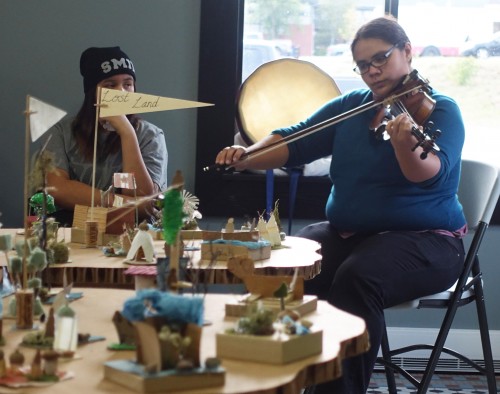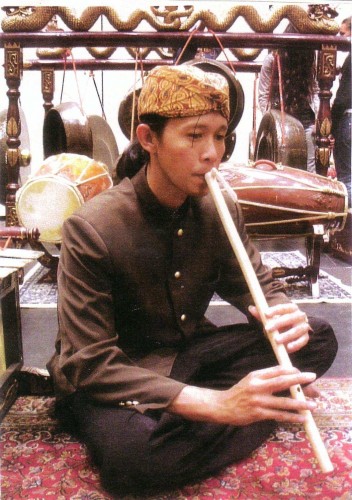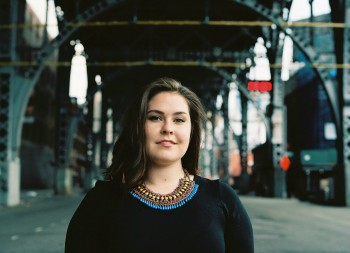Community-engaged arts practices have experienced tremendous exponential growth over the last few decades with many musical presenters taking on this mandate alongside their usual concert production activities. At the heart of this artistic practice is a dialogue between professional artists and community organizations with the outcome being a collective artistic expression. The process involved is considered as important as the final artistic result. In this month’s column, I’ll be looking at a cross-section of different community-based projects to give you a bird’s-eye look at different community-focused events in March.
 First though, a very preliminary view of an intriguing work in progress being co-produced by Soundstreams and Jumblies Theatre. Anishinaabe composer Melody McKiver has been commissioned by these two organizations to compose a work for string quartet and recorded voices.
First though, a very preliminary view of an intriguing work in progress being co-produced by Soundstreams and Jumblies Theatre. Anishinaabe composer Melody McKiver has been commissioned by these two organizations to compose a work for string quartet and recorded voices.
As synchronicity would have it, I was introduced to McKiver in a local restaurant, in early February, by Jumblies’ artistic director Ruth Howard, just before Soundstreams presented a performance of Steve Reich’s Different Trains, also a work for string quartet and pre-recorded tape. (My concert report of that evening can be viewed on The WholeNote website). Little did I realize at the time McKiver’s upcoming connection to what we were about to hear that night.
Wanting to find out more about the project, I spoke recently on the phone with McKiver who was just ending a residency at the Banff Centre that brought together various Indigenous composers and performers. In our conversation, McKiver told me that Reich’s music has been a major influence and inspiration, particularly while studying for an undergraduate degree in viola performance at York University where they spent endless hours listening to Different Trains –.“at least 100 times,” they said. The new commissioned work is titled Odaabaanag, which means trains or wagons in Ojibwe, and is their response to Different Trains, composed in 1988. They will be using Reich’s methodology but looking at a different subject. Different Trains is Reich’s reflection as a Jewish-American composer on the Holocaust which he, living in the USA during the war, did not personally experience. McKiver’s work will also be for string quartet and recorded voices and will be McKiver’s reflection as a young Anishinaabe composer who did not live through the residential school era, but lives with the impact of what happened.
In much the same way that Reich created his work from the speech rhythms of various interviews he conducted, McKiver will be interviewing Indigenous elders from their community—the Lac Seul First Nation—as well as others from Sioux Lookout in Northern Ontario, the home of a large Indigenous population. They will use excerpts from these recordings to form the melodic and rhythmic content of the work. Currently, McKiver is in the beginning stages of the compositional process, conducting the interviews and transcribing and reviewing the recordings to find those key phrases to use in the composition. The first elder they interviewed was Garnet Angeconeb, a well-known residential school advocate. I was shaken up when McKiver told me the story that Angeconeb spoke about in the interview. During the 1930s, the Lac Seul First Nation community was flooded causing the loss of their entire land base. The cause of this flooding was a hydro dam project which the community was not told of and almost overnight, up to 40 feet of water appeared, destroying people’s homes and livelihoods. It was an apocalyptic moment, McIver said, that continues to have an ongoing impact on the community.
While Jumblies and Soundstreams are based in Toronto, McKiver has been given the opportunity and flexibility to work from their own land base. “This is so integral to being an Indigenous composer, to still live on my ancestral homelands and to be able to share this work.” They’ll be providing excerpts from the interview tapes as well as Skyping in to dialogue with Jumblies’ community groups in Toronto. “There will be a long discussion process throughout the creation of the work,” McKiver said. “People won’t just be meeting the voices of my elders through the format of a string quartet, but the community will be able to listen to a 20-minute story rather than just a three-minute excerpt used in the string quartet. This way they can become acquainted with the stories and teachings that are being shared with me in multiple ways.” Working with these stories has profound meaning for McKiver and navigating the transition point between the recorded stories and the string quartet form is challenging. McKiver seeks to “honour the stories that have been shared with me and this process is giving me a moment to deeply reflect on the teachings that I have been gifted. An important part of the process for me is to find a way where I can amplify these voices in a manner that is respectful.” A work-in-progress performance is planned for May 2019 with the premiere performance scheduled for November 2019. Additional plans include a potential tour to Sioux Lookout as well as possible inclusion of interdisciplinary elements arising from the overall process. As well, there will be a companion choral piece composed by Melody’s mother, Beverley McKiver, using the same themes and source material to be performed by the Gather Round Singers, Jumblies’ mixed-ability, mixed-age community choir.
History of Bathurst Street Sounds
The History of Bathurst Street Sounds is another community-based partnership project, bringing together the Music Gallery, A Different Booklist, 918 Bathurst and Myseum of Toronto. On March 24, people can learn about the history of Bathurst Street soundscapes during a panel discussion and photo gallery launch at A Different Booklist to be followed by a parade to 918 Bathurst St. for an exhibition of Bathurst St. music archives. The history of music on Bathurst St. largely centres around various clubs, shops and the prominent Western Indian community historically located on Bathurst around Bloor. The extensive cluster of influential clubs in the Bathurst area included The Trane Studio, Lee’s Palace, the Annex Wreckroom/Coda, and even Sneaky Dee’s, originally located across from Honest Ed’s. Clothing stores such as Too Black Guys helped supply the apparel for many golden-age hip-hop videos, and even Honest Ed’s was once a destination for record buyers before its tenant Sonic Boom moved elsewhere. Various calypso mas ensembles were associated with spots in the area and the bookstore A Different Booklist has hosted a variety of Afrocentric cultural activities over the years. With all the changes happening in the neighbourhood and with the reconstruction of the Bloor/Bathurst intersection and much of Markham St, this event offers a rare opportunity to listen in to soundworlds both past and present.
Evergreen Club Contemporary Gamelan
Gamelan music originates from Indonesia where its unique and complex sound textures have provided an essential and vital role in Indonesian community life with every town having its own gamelan and local musical traditions. The word gamelan refers to an orchestra of mainly percussion instruments crafted of metal arranged in rows on the floor including gongs hung from carved wooden racks. Other instruments include voice, a wind instrument called the suling and solo string-based instruments.
Canadian composer Colin McPhee (1900–1964) is well known for being the first Western composer to study the music of Bali and Java, and his associations, with American composers Henry Cowell and Lou Harrison for example, helped to usher in what became known as world music. Despite current sensitivities about cultural appropriation, this phenomenon of bringing non-Western influences into Western concert music has had far-reaching impact.
 In 1983, composer Jon Siddall, with the assistance of Lou Harrison, established Canada’s first ensemble performing on Indonesian gamelan instruments in Toronto – the Evergreen Club Contemporary Gamelan. The ECCG will be celebrating 35 years of commissioning, performing and recording contemporary music for gamelan with a concert on March 7 featuring music by master musician-composers Ade Suparman and Burhan Sukarma from West Java, Indonesia; Gilles Tremblay and Estelle Lemire from Quebec; as well as Peter Hatch and Bill Parsons from BC and Ontario. Playing on a grouping of instruments indigenous to West Java known as a gamelan degung playing in the Sundanese style, this pioneering Canadian ensemble has made a significant mark on the global gamelan scene and is committed to including Indonesian musicians and their music in their repertoire, as this concert demonstrates. One of ECCG’s distinctive characteristics is the pursuit of a hybrid sound, combining gamelan, electroacoustics, minimalism, field recordings and elements of acoustic ecology, for example. Currently, they provide opportunities for the larger Toronto community to play their instruments at an ongoing meetup that happens on the second Sunday of the month at Arraymusic.
In 1983, composer Jon Siddall, with the assistance of Lou Harrison, established Canada’s first ensemble performing on Indonesian gamelan instruments in Toronto – the Evergreen Club Contemporary Gamelan. The ECCG will be celebrating 35 years of commissioning, performing and recording contemporary music for gamelan with a concert on March 7 featuring music by master musician-composers Ade Suparman and Burhan Sukarma from West Java, Indonesia; Gilles Tremblay and Estelle Lemire from Quebec; as well as Peter Hatch and Bill Parsons from BC and Ontario. Playing on a grouping of instruments indigenous to West Java known as a gamelan degung playing in the Sundanese style, this pioneering Canadian ensemble has made a significant mark on the global gamelan scene and is committed to including Indonesian musicians and their music in their repertoire, as this concert demonstrates. One of ECCG’s distinctive characteristics is the pursuit of a hybrid sound, combining gamelan, electroacoustics, minimalism, field recordings and elements of acoustic ecology, for example. Currently, they provide opportunities for the larger Toronto community to play their instruments at an ongoing meetup that happens on the second Sunday of the month at Arraymusic.
Barbara Croall
On March 31, a newly commissioned oratorio, Miziwe… (Everywhere… ), by Odawa First Nation composer and musician Barbara Croall, will be premiered by the Pax Christi Chorale and sung in Ojibwe Odawa with surtitles. In October 2018, I had the great honour of attending another one of Croall’s premieres in Montreal – Saia’tatokénhti: Honouring Saint Kateri. I attended two performances of this work – the first at the Kahnawake Catholic Church located on Kahnawake Mohawk Territory, and the second at St. Jean Baptiste Church in Montreal. The music was performed by the McGill Chamber Orchestra, conducted by Boris Brott, who played a key role at various stages of the work’s gestation, both in terms of his mentorship of Tara-Louise Montour, the work’s solo violinist, and in suggesting that Croall consider composing the music for the project. The texts (by Darren Bonaparte) were spoken in Mohawk by a member of the Kahnawake community. The piece also included traditional Mohawk music sung by community members. The work told the story of Kateri Tekakwitha, a17th-century Mohawk young woman who converted to Catholicism after a traumatic exodus from her traditional homelands in upstate New York due to her villages being razed by fire. She ended up with the Jesuit mission on the south shore of the St. Lawrence River and was believed to have extraordinary healing abilities. She was eventually canonized as a saint.
To create that work, Croall spoke at length with elders from Kahnawake and Kanasatake, as well as elders in her own community, particularly about their Catholic faith and how they understand that in light of the church’s treatment of Indigenous people in residential schools. In an interview she gave before the performance, she spoke about how these elders understand their Christian faith as being different from the European form, and in their mind they have transformed Catholicism into a matriarchal belief system, blending Mary with the traditional corn goddess.
In this latest commissioned work, Miziwe… (Everywhere…), Croall will be performing on cedar flute and voice along with Rod Nettagog, an Ojibwe (Makwa Dodem/Bear Clan) performer from the Henvey Inlet First Nation who also performed in Croall’s orchestral work Midwewe’igan (Sound of the Drum). Other performers include Krisztina Szabó, mezzo soprano; Justin Welsh, baritone; and the Toronto Mozart Players. Croall has recently been appointed artist-in-residence and cultural consultant by the Kitchener-Waterloo Symphony.
IN WITH THE NEW QUICK PICKS
MAR 16, 8PM: Array Space, Arraymusic. The latest in the Rat-drifting series curated by Martin Arnold features artist and improviser Juliana Pivato. This performance will include various experiments on popular song.
MAR 19, 7:30PM: Canadian Music Centre. Pianist R. Andrew Lee performs Ann Southam’s Soundings for New Piano.
MAR 24, 8PM: Esprit Orchestra’s “Grand Slam!” concert features Trompe l’oeil, a world premiere by Canadian Christopher Thornborrow; Japanese composer Maki Ishii’s Afro-Concerto; and Unsuk Chin’s (Korea) Cello Concerto.
 MAR 29, 8PM: Music Gallery. The latest concert in the Emergents Series with pianist Jana Luksts and the ensemble Happenstance who will present recital projects shaped around reimagining how classical music can sound, transforming the chamber music format into something new.
MAR 29, 8PM: Music Gallery. The latest concert in the Emergents Series with pianist Jana Luksts and the ensemble Happenstance who will present recital projects shaped around reimagining how classical music can sound, transforming the chamber music format into something new.
APR 5 7:30: Esprit Orchestra presents their New Wave Reprise Festival featuring world premieres by five emerging composers: Emblem by Eugene Astapov; Music about Music by Quinn Jacobs ; Foreverdark by Bekah Simms; as within, so without by Christina Volpini; and Temporal by Alison Yun-Fei Jiang. A keynote address by Montreal composer John Rea will round out the evening.
Wendalyn Bartley is a Toronto-based composer and electro-vocal sound artist. sounddreaming@gmail.com.



